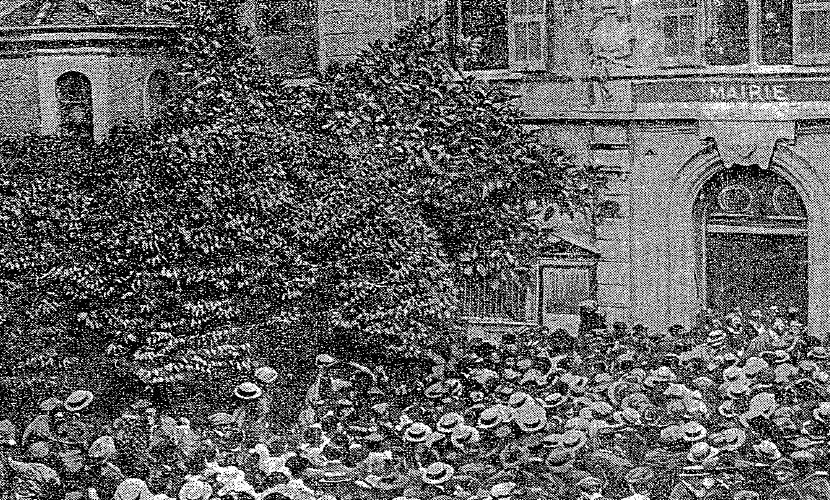Monégasque Revolution on:
[Wikipedia]
[Google]
[Amazon]
 The Monégasque Revolution of 1910 was a series of confrontations by the subjects of
The Monégasque Revolution of 1910 was a series of confrontations by the subjects of
 The Monégasque Revolution of 1910 was a series of confrontations by the subjects of
The Monégasque Revolution of 1910 was a series of confrontations by the subjects of Monaco
Monaco (; ), officially the Principality of Monaco (french: Principauté de Monaco; Ligurian: ; oc, Principat de Mónegue), is a sovereign city-state and microstate on the French Riviera a few kilometres west of the Italian region of Lig ...
against their ruler, Prince Albert I
Albert I (Albert Honoré Charles Grimaldi; 13 November 1848 – 26 June 1922) was Prince of Monaco from 10 September 1889 until his death. He devoted much of his life to oceanography, exploration and science. Alongside his expeditions, Albert I ...
. It led to the end of absolute monarchy
Absolute monarchy (or Absolutism as a doctrine) is a form of monarchy in which the monarch rules in their own right or power. In an absolute monarchy, the king or queen is by no means limited and has absolute power, though a limited constitut ...
with the promulgation of the Constitution of Monaco
The Constitution of Monaco, first adopted in 1911 after the Monégasque Revolution and heavily revised by Prince Rainier III on 17 December 1962, outlines three branches of government, including several administrative offices and a number of counc ...
the following year.
Popular demands
The subjects had several grievances against the prince. There was severe unemployment as the country lacked farmlands or factories and the gaming establishment banned the hiring of the prince's subjects. Their national pride was hampered by a poor reputation as "the moral cesspool of Europe". In addition, the prince spent his money in France rather than at home. They demanded a constitution and a parliament with the threat of overthrowing the monarchy and establishing arepublic
A republic () is a "state in which power rests with the people or their representatives; specifically a state without a monarchy" and also a "government, or system of government, of such a state." Previously, especially in the 17th and 18th c ...
should the prince fail to comply. Other demands included the termination of Camille Blanc
Camille Blanc (; 1847 in Paris – 1927), was a French municipal leader, with many interests in Monaco. From 1904 to 1925, he was founding mayor of Beausoleil, a town adjacent to Monte Carlo, which had previously formed part of La Turbie and had ...
and Roland Bonaparte
Roland Napoléon Bonaparte, 6th Prince of Canino and Musignano (19 May 1858 – 14 April 1924) was a French prince and president of the Société de Géographie from 1910 until his death. He was the last male-lineage descendant of Lucien Bonaparte ...
's monopoly over the gaming establishment, the removal of French citizens from state offices, and the separation of the prince's finances from the state's.
In early March 1910, a delegation made up of Suffren Peymond, Théodore Gastaud, André Marsan and Charles Bellando de Castro arrived to deliver an ultimatum
An ultimatum (; ) is a demand whose fulfillment is requested in a specified period of time and which is backed up by a threat to be followed through in case of noncompliance (open loop). An ultimatum is generally the final demand in a series o ...
to the prince. Later that month, the prince acquiesced to their demands. For the rest of the year, there were protests against French domination of Monaco's government and economy. The Prince's Palace was also stormed by an angry mob who looted the palace.
The prince escaped with the help of the ''Compagnie des Carabiniers du Prince
The Compagnie des Carabiniers du Prince (in Monegsque: ''Cumpagnia d’i Carrabiniei d’u Pri̍ncipu'', Prince's Company of Riflemen in English) is the Infantry branch of the ''Force Publique'', and one of the limited number of militaries that ...
'', and stayed in France until the riots died down. Soldiers of the Compagnie did try to defend the palace but ultimately failed after the day-long riot.
Constitution
On 5 January 1911, a new constitution was promulgated. Nevertheless, Prince Albert I still wielded considerable power and suspended the constitution duringWorld War I
World War I (28 July 1914 11 November 1918), often abbreviated as WWI, was one of the deadliest global conflicts in history. Belligerents included much of Europe, the Russian Empire, the United States, and the Ottoman Empire, with fightin ...
. After Prince Albert I's death in 1922, ''The New York Times
''The New York Times'' (''the Times'', ''NYT'', or the Gray Lady) is a daily newspaper based in New York City with a worldwide readership reported in 2020 to comprise a declining 840,000 paid print subscribers, and a growing 6 million paid ...
'' published a 1921 interview with him on the process and his views on the need for the 1911 revolution.
See also
* Albert I, Prince of Monaco#Later life * Camille Blanc#Persona non grata in MonacoReferences
Conflicts in 1910 History of Monaco 20th-century revolutions Wars involving Monaco Republicanism in Monaco 1910 in Monaco {{Monaco-poli-stub